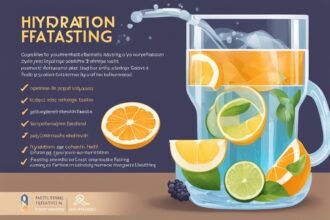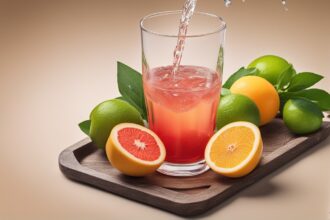Hey there, fellow fasters! If you’re diving into the world of fasting, whether for health, spiritual reasons, or weight management, there’s one crucial element you can’t overlook: hydration. In this comprehensive fasting guide, we’ll explore why staying hydrated is non-negotiable during fasting, how dehydration can sneak up on you, and actionable ways to keep your body balanced. Fasting can be a powerful tool for wellness, but without proper water intake, you might be setting yourself up for fatigue, headaches, or worse. So, let’s chat about how to hydrate smartly while fasting, backed by science and sprinkled with practical tips I’ve learned along the way.
Why Hydration Matters in Your Fasting Guide
When you fast, your body isn’t just skipping meals—it’s entering a unique metabolic state. Water becomes your best friend because it supports every bodily function, from regulating temperature to flushing out toxins. During fasting, especially prolonged or intermittent fasting, you’re not getting hydration from food (which typically accounts for about 20% of your daily water intake) (Institute of Medicine, 2005). Without replacing that, dehydration can set in fast, leading to dizziness, irritability, and even impaired cognitive function (Pross et al., 2014). Staying hydrated isn’t just a nice-to-have in your fasting routine; it’s essential for safety and effectiveness.
Understanding Dehydration Risks During Fasting
Let’s get real for a second—fasting without proper hydration can be a recipe for trouble. When you abstain from food and drink (in some fasting types like dry fasting), your body loses water through sweat, urine, and even breathing. Studies show that even mild dehydration—losing just 1-2% of your body weight in water—can cause headaches, fatigue, and reduced concentration (Sawka et al., 2015). For those following a fasting plan like Ramadan fasting, where no water is consumed from dawn to dusk, the risk is even higher if you don’t hydrate adequately during non-fasting hours. Recognizing early signs like dry mouth, dark urine, or lethargy can save you from bigger health hiccups.
How Much Water Do You Need While Fasting?
So, how much water should be part of your fasting guide? The answer depends on your body, activity level, and the type of fast. The general recommendation for adults is about 2-3 liters (8-12 cups) of water daily under normal conditions (Institute of Medicine, 2005). During fasting, aim to meet or slightly exceed this, especially if you’re active or live in a hot climate. For intermittent fasting (like the 16:8 method), sip water consistently during your eating window and even during fasting hours if your protocol allows. If you’re doing a water-only fast, spacing out your intake prevents overloading your system at once. Listen to your body—thirst is a late indicator of dehydration, so don’t wait for it to kick in!
Practical Hydration Tips for Your Fasting Routine
Now that we’ve covered the why and how much, let’s dive into the how. Hydrating during fasting doesn’t have to be complicated, but it does require a bit of planning. Here are some tried-and-true strategies I’ve used to stay on top of my water game while following a fasting schedule. These tips can help whether you’re a newbie or a seasoned faster looking to refine your approach.
- Start Your Day Hydrated: Drink a large glass of water first thing in the morning, especially if your fast includes overnight hours. This kickstarts your hydration for the day.
- Carry a Water Bottle: Keep a reusable bottle with you as a constant reminder. I’ve found that having water within arm’s reach makes sipping second nature.
- Set Reminders: Use your phone or a hydration app to nudge you to drink every hour, especially during eating windows or post-fast rehydration.
- Add Electrolytes (When Allowed): If your fast permits, add a pinch of salt or an electrolyte supplement to your water to replace sodium and potassium lost through sweat (Montain et al., 2006).
What to Drink (and Avoid) During Fasting
Not all liquids are created equal when it comes to fasting hydration. If you’re following a strict water fast as part of your fasting plan, plain water is your go-to. But for other fasting types like intermittent fasting, you might have some wiggle room. Let’s break down the best options and what to steer clear of to maintain the benefits of your fast.
- Plain Water: The gold standard. It’s calorie-free and keeps your fast intact while hydrating effectively.
- Herbal Teas: Unsweetened herbal teas (like chamomile or peppermint) can be a flavorful way to hydrate without breaking most fasts.
- Black Coffee: In moderation, black coffee (no sugar or cream) can be okay for some fasting protocols and may even suppress appetite (Schubert et al., 2017).
- Avoid Sugary Drinks: Sodas, juices, or even “zero-calorie” drinks with artificial sweeteners can spike insulin and disrupt fasting benefits.
- Limit Alcohol: If you’re in an eating window, avoid alcohol as it dehydrates you and can counteract your fasting goals.
Special Considerations for Different Fasting Types
Not every fasting guide fits all fasting styles. Hydration needs vary depending on whether you’re doing a 24-hour fast, intermittent fasting, or a religious fast like Ramadan. For instance, during Ramadan, you must front-load and back-load hydration during Suhoor (pre-dawn meal) and Iftar (evening meal) to compensate for daytime abstinence. Research suggests consuming hydrating foods like watermelon or cucumber during these meals can boost water intake (Hosseini et al., 2013). For longer water fasts, monitor for signs of electrolyte imbalance like muscle cramps, and consult a healthcare provider if fasting exceeds 24-48 hours. Tailoring hydration to your fasting schedule ensures you stay safe while reaping the rewards.
To wrap things up, hydration is the cornerstone of a successful fasting journey. Whether you’re following a detailed fasting guide or just starting out, prioritizing water intake can make the difference between feeling energized and hitting a wall. Remember to plan ahead, listen to your body, and adjust based on your fasting style. Fasting is a personal path, and with the right hydration habits, you can make it a sustainable and rewarding part of your health routine. Got any hydration tips that have worked for you during fasting? Drop them in the comments—I’d love to hear your story!
References
- Institute of Medicine. (2005). Dietary Reference Intakes for Water, Potassium, Sodium, Chloride, and Sulfate. National Academies Press.
- Pross, N., Demazières, A., Girard, N., Barnouin, R., Metzger, D., Klein, A., … & Guelinckx, I. (2014). Effects of changes in water intake on mood of high and low drinkers. PLoS ONE, 9(4), e94754.
- Sawka, M. N., Cheuvront, S. N., & Kenefick, R. W. (2015). Hypohydration and human performance: Impact of environment and physiological mechanisms. Sports Medicine, 45(Suppl 1), S51-S60.
- Montain, S. J., Cheuvront, S. N., & Sawka, M. N. (2006). Exercise associated hyponatraemia: Quantitative analysis to understand the aetiology. British Journal of Sports Medicine, 40(2), 98-105.
- Schubert, M. M., Irwin, C., Seay, R. F., Clarke, H. E., Allegro, D., & Desbrow, B. (2017). Caffeine, coffee, and appetite control: A review. International Journal of Food Sciences and Nutrition, 68(8), 901-912.
- Hosseini, S. R., Rajikan, R., & Tabatabaei, S. (2013). Hydration status and fluid intake during Ramadan. Journal of Fasting and Health, 1(1), 32-38.






